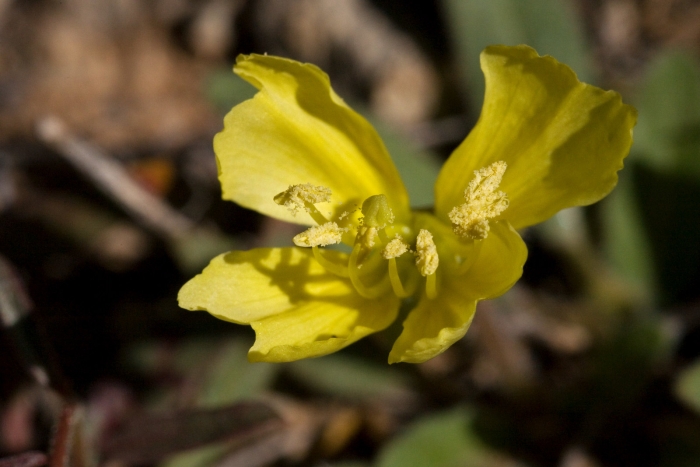Desert Evening Primrose
(Oenothera primiveris)
Desert Evening Primrose (Oenothera primiveris)
/
/

Patrick Alexander
CC0
Image By:
Patrick Alexander
Recorded By:
Copyright:
CC0
Copyright Notice:
Photo by: Patrick Alexander | License Type: CC0 | License URL: http://creativecommons.org/publicdomain/zero/1.0/deed.en | Uploader: Josve05a | Publisher: Wikimedia Commons |







































Estimated Native Range
Summary
Oenothera primiveris, commonly known as Desert Evening Primrose, is an annual herb native to desert regions and sandy plains of the Southwestern United States and Northwestern Mexico. It typically forms a dense rosette of foliage close to the ground, with leaves that can reach up to 28 centimeters long, featuring wavy or crinkled edges, or deep lobes or teeth. The plant lacks a true stem, and its bright yellow flowers, which can be up to 4 centimeters in length, emerge from the leaf axils, gradually fading to orange or red as they age. The flowering season extends from February through May, and the flowers are particularly showy at night, attracting nocturnal pollinators. The fruit is a straight or curving capsule up to 6 centimeters long.
Desert Evening Primrose is valued for its drought tolerance and showy, fragrant flowers that open in the evening and close by the next midday. It is often used in xeriscaping, rock gardens, and naturalized desert plantings. This plant thrives in full sun and requires well-drained soils, preferably sandy or gravelly, and can tolerate low to medium water conditions. While it is easy to grow and maintain, it can self-seed prolifically under ideal conditions, which should be considered in garden planning to prevent unwanted spread.CC BY-SA 4.0
Desert Evening Primrose is valued for its drought tolerance and showy, fragrant flowers that open in the evening and close by the next midday. It is often used in xeriscaping, rock gardens, and naturalized desert plantings. This plant thrives in full sun and requires well-drained soils, preferably sandy or gravelly, and can tolerate low to medium water conditions. While it is easy to grow and maintain, it can self-seed prolifically under ideal conditions, which should be considered in garden planning to prevent unwanted spread.CC BY-SA 4.0
Plant Description
- Plant Type: Herb
- Height: 0.3-0.7 feet
- Width: 1-1.5 feet
- Growth Rate: Moderate
- Flower Color: Yellow
- Flowering Season: Spring
- Leaf Retention:
Growth Requirements
- Sun: Full Sun
- Water: Low
- Drainage: Fast
Common Uses
Bee Garden, Bird Garden, Butterfly Garden, Deer Resistant, Drought Tolerant, Hummingbird Garden, Low Maintenance, Rabbit Resistant, Showy Flowers
Natural Habitat
Native to desert regions and sandy plains of the Southwestern United States and Northwestern Mexico
Other Names
Common Names: Yellow Desert Evening Primrose, Bottle Evening-Primrose, Desert Evening-Primrose, Desert Eveningprimrose
Scientific Names: , Oenothera primiveris, Oenothera primiveris var. primiveris, Oenothera johnsonii, Pachylophis johnsonii, Gaura primiveris, Lavauxia priminervis, Pachylophus johnsonii,
GBIF Accepted Name: Oenothera primiveris A.Gray